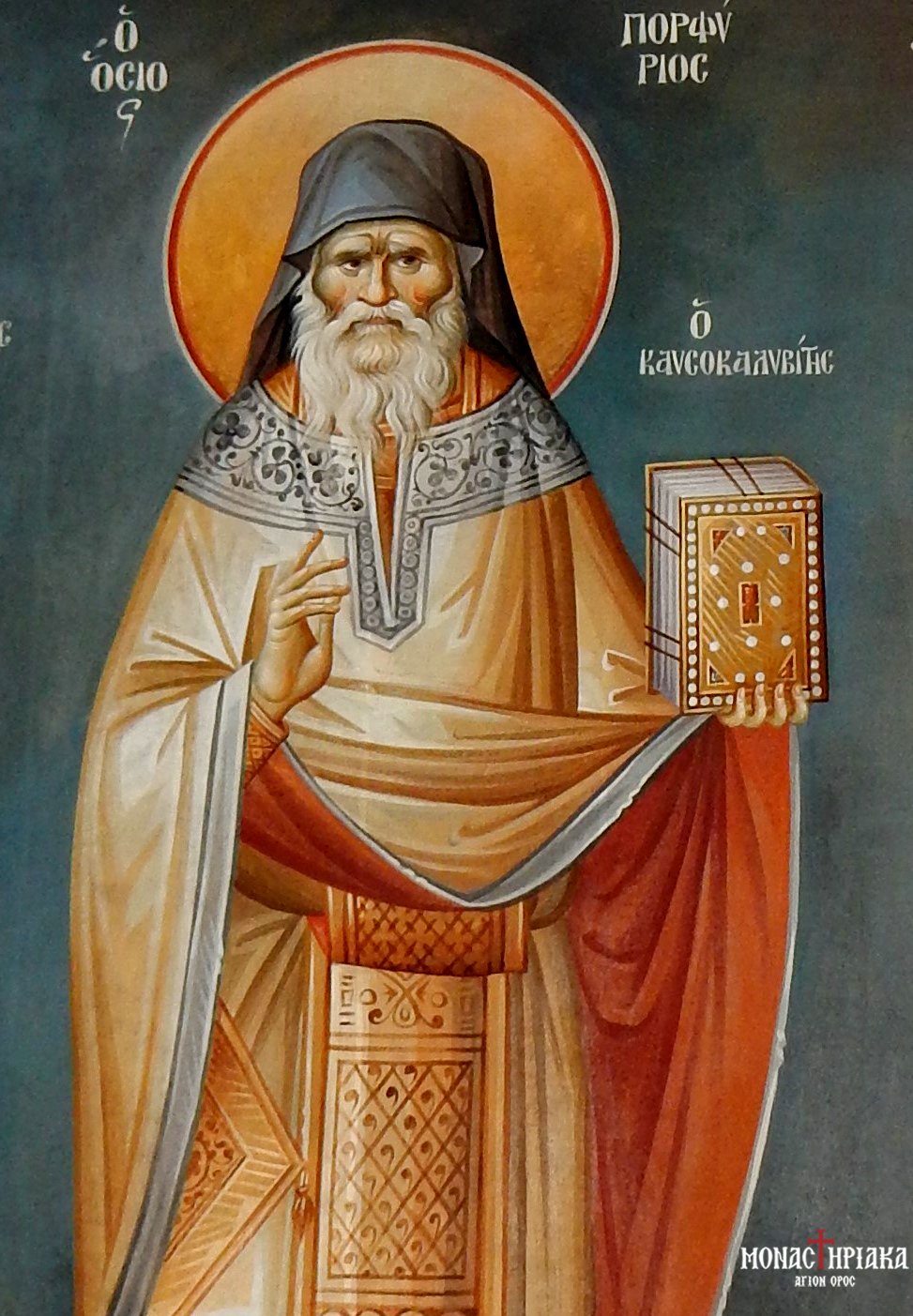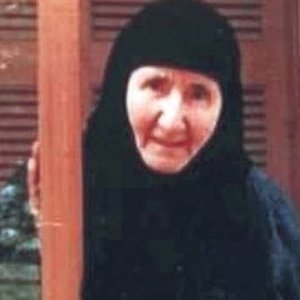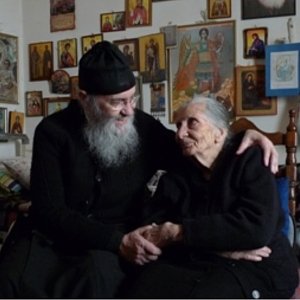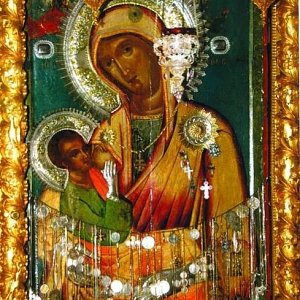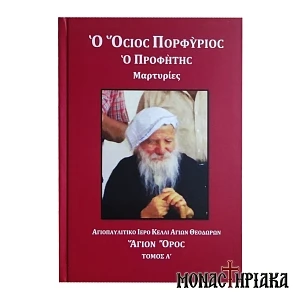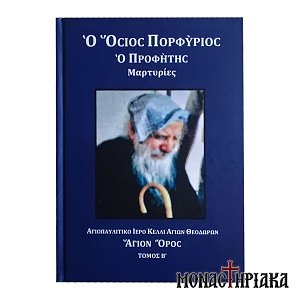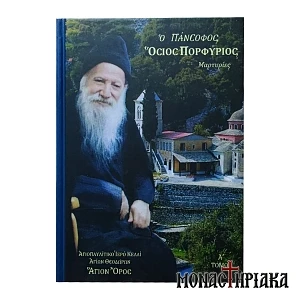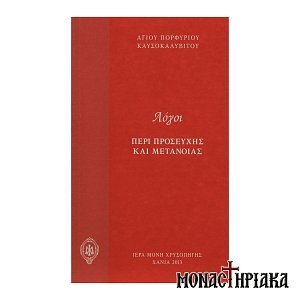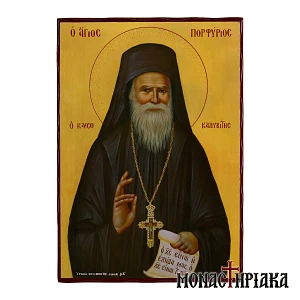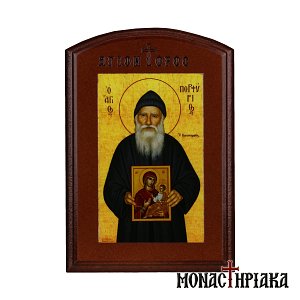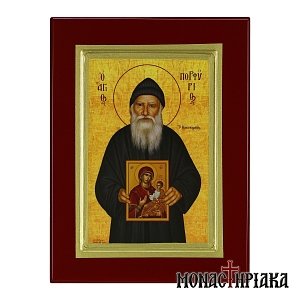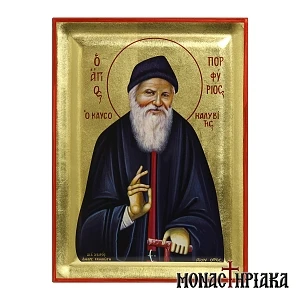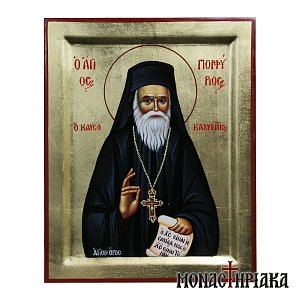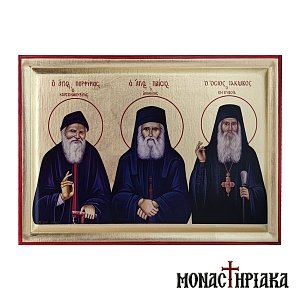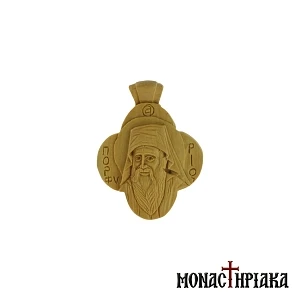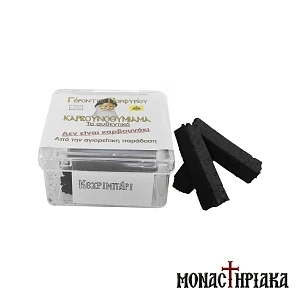Elder Porphyrios was born on the 7th of February 1906, in the village of St. John Karystia, near Aliveri, in the province of Evia. His parents were poor but pious farmers. His father's name was Leonidas Bairaktaris and his mother's was Eleni, the daughter of Antonios Lambrou. At baptism he was given the name Evangelos. He was the fourth of five children, and the third child of the four that survived. His oldest sister, Vassiliki, passed away when she was a year old.
His father had a monastic calling but obviously did not become a monk. He was, however, the village cantor, and St. Nectarios called upon his services during his journeys through the area, but poverty forced him to immigrate to America to work on the construction of the Panama Canal.
Childhood years
The Elder attended the school in his village for only two years. Evangelos left school, worked on the family farm and tended the few animals that they owned. He started working from the age of eight. Even though he was still very young, in order to make more money, he went to work in a coal mine. He later worked in a grocer's store in Halkhida and in Piraeus. His father had taught him the Supplicatory Canon (Paraklisis) to the Mother of God (Panagia), and many more teachings of our faith. As a child, he was very serious, industrious and diligent.
Monastic calling
While he was looking after the sheep, and even when working in the grocer’s store, he slowly read the life story of St. John the Hut-dweller. He wanted to follow the example of the saint. So, he set off for Mt. Athos many times, but for various reasons he never made it and returned home. Finally, when he was about fourteen or fifteen years of age, he again left for Mt. Athos. This time he was determined to make it and this time he did.
The Lord, who watches over the destinies of us all, brought about things in such a way that Evangelos met his future spiritual father, the hieromonk Panteleimon, while he was on the ferry boat between Thessaloniki and the Holy Mountain [Mt. Athos]. Father Panteleimon immediately took the young boy under his wing. Evangelos was not yet an adult, and so should not have been allowed on the Holy mountain. Fr. Panteleimon said he was his nephew and his entrance was assured.
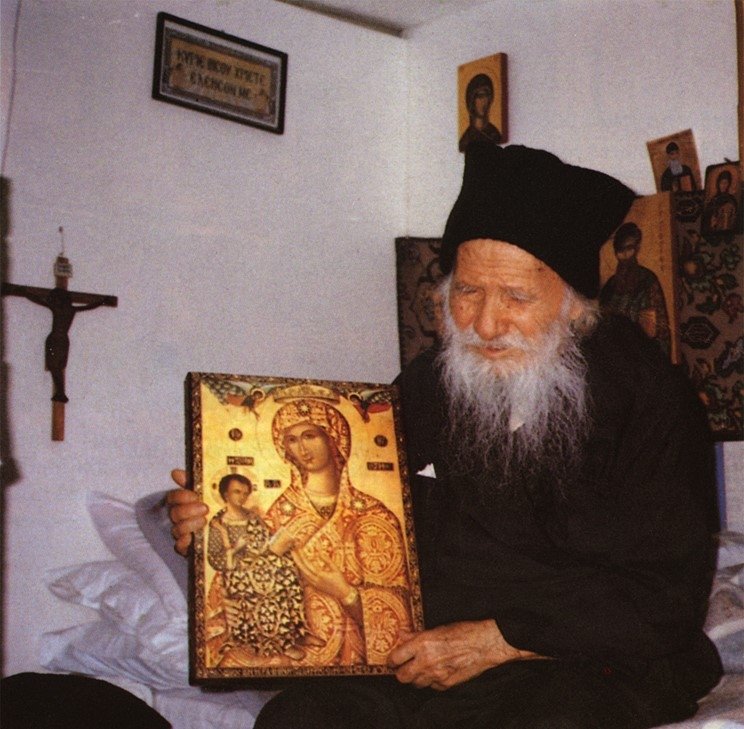
The monastic life
His elder, Fr. Panteleimon, took him to Kavsokalyvia to the Hut of St. George. Father Panteleimon lived there with his brother Father Ioannikios. The well-known monk, the blessed Hatzigeorgios had once lived there too.
In this way, Elder Porphyrios acquired two spiritual fathers at the same time. He gladly gave absolute obedience to both of them. He embraced the monastic life with great zeal. His only complaint was that his elders did not demand enough of him. He told us very little about his ascetic struggles and we have only few details. From what he very rarely said to his spiritual children about it, we can conclude that he happily and continuously struggled hard. He would walk barefoot among the rocky and snowy paths of the Holy Mountain. He slept very little, and then with only one blanket and on the floor of the hut, even keeping the window open when it was snowing. During the night, he would make many prostrations, stripping himself to the waist so that sleep would not overcome him. He worked hard; wood-carving or outside cutting down trees, gathering snails or carrying sacks of earth on his back for long distances, so that a garden could be created on the rocky terrain near the Hut of St. George.
He also immersed himself in the prayers, services and hymns of the Church, learning them by heart while working with his hands. Eventually from the continual repetition of the Gospel and from learning it by heart the same way, he was unable to have thoughts that were not good or that were idle. He characterized himself, in those years, as being "forever on the move".
However, the distinguishing mark of his ascetic struggle was not the physical effort he made, but rather, his total obedience to his elder. He was completely dependent upon him. His will disappeared into his elder’s will. He had total love faith and devotion for his elder. He identified himself completely with him, making his elder’s conduct in life his own conduct. It is here that we find the essence of it all. It is here, in his obedience, that we discover the secret, the key to his life.
This uneducated boy from the second grade, using the Holy Scriptures as his dictionary, was able to educate himself. We do not know exactly when but certainly not long after reaching the Holy Mountain, he was tonsured as a monk and given the name Nikitas.
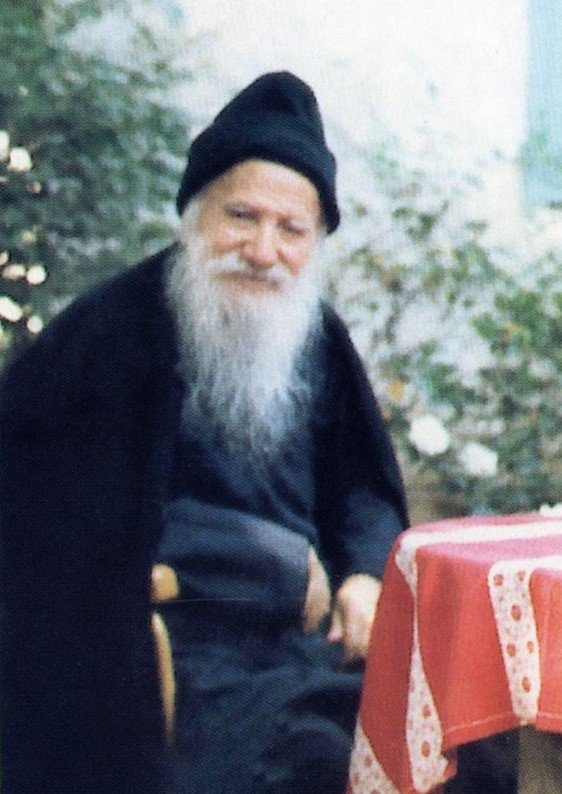
The visitation of divine grace
We should not find it strange that divine grace should rest upon this young monk, who was filled with fire for Christ and gave everything for His love. He never once considered all his labors and struggles.
It was still dawn, and the main church of Kavsokalyvia was locked. Nikitas, however, was standing in the corner of the church entrance waiting for the bells to ring and the doors to be opened. He was followed by the old monk Dimas, a former Russian officer, over ninety years old, an ascetic and a secret saint. Fr. Dimas looked around and made sure that nobody was there. He didn’t notice young Nikitas waiting in the entrance. He started making full prostrations and praying near the closed church doors.
Divine grace spilled over from holy Fr. Dimas and cascaded down upon the young monk Nikitas, who was then ready to receive it. His feelings were indescribable. On his way back to the hut, after receiving Holy Communion in the Divine Liturgy that morning, his feelings were so intense that he stopped, stretched out his hands and shouted loudly "Glory to You, Oh God! Glory to You, Oh God! Glory to You, Oh God!".
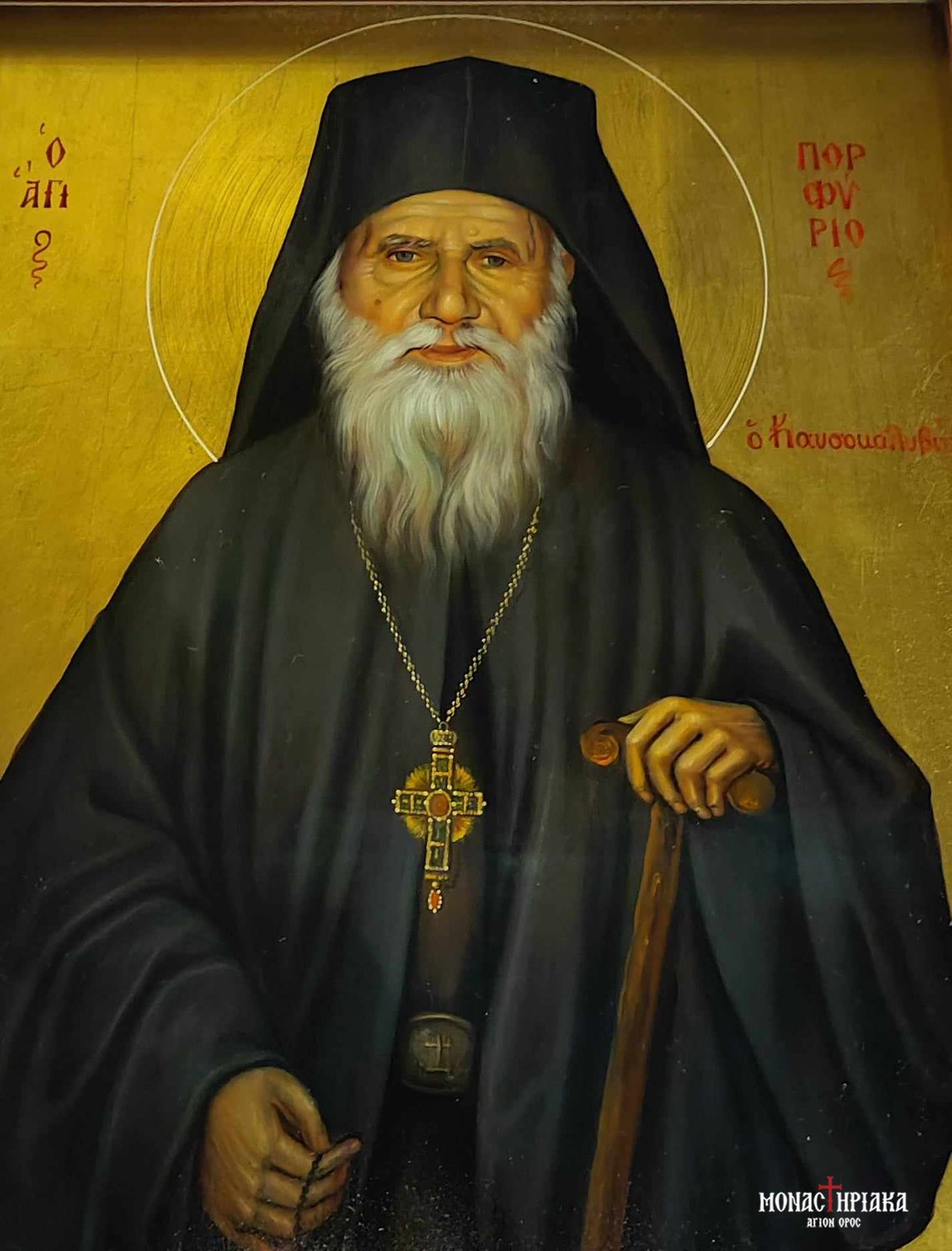
The change wrought by the Holy Spirit
Following the visitation of the Holy Spirit, a fundamental change took place in the psychosomatic makeup of young Monk Nikitas. It was the change that comes directly from the right hand of God. He acquired supernatural gifts and was vested with power from God.
The first sign of these gifts was when his elders were returning from a far-away journey, he was able to "see" them at a great distance. He "saw" them there, where they were, even though they were not within human sight. He confessed this to Fr. Panteleimon, who advised him to be very cautious about his gift and to tell no-one, advice, which he followed very carefully until he was told to do otherwise.
More followed. His sensitivity to things around him became very acute and his human capacities developed to their fullest. He listened to and recognized bird and animal voices to the extent that he knew not just where they came from, but what they were saying. His sense of smell was developed to such a degree that he could recognize fragrances at a great distance. He knew the different types of aroma and their makeup. After humble prayer, he was able to "see" the depths of the earth and the far reaches of space. He could see through water and through rock formations. He tasted the quality of water in the depths of the earth. He looked at people and was able to heal. He prayed and his prayer became reality. However, he never knowingly tried to use these gifts from God to benefit himself. He never asked for his own ailments to be healed. He never tried to get personal gain from the knowledge extended to him by divine grace.
Every time he used his gift of discernment (diakrisis), the hidden thoughts of the human mind were revealed to him. He was able, through the grace of God, to see the past, the present and the future all at the same time. He confirmed that God is all-knowing and all-powerful. He was able to observe and touch all creation, from the edges of the Universe to the depth of the human soul and history. St. Paul’s phrase "One and the same Spirit works all these things, distributing to each one individually as He wills" (1.Cor.12:11) certainly held true for Elder Porphyrios. Naturally, he was a human being, and received divine grace, which comes from God. Life lived in grace is an unknown mystery for us. The Elder always pointed this out to all those, who attributed his abilities to something other than grace. He underlined this fact, again and again, saying "It’s not something that’s learnt. It’s not a skill. It is Grace!."
Return to the world
Even after being overshadowed by divine grace, this young disciple of the Lord continued in his ascetic struggles as before, with humility, godly zeal and unprecedented love of learning. The Lord now wanted to make him a teacher and shepherd of His rational sheep. He tried him out, measured him up, and found him adequate.
Monk Nikitas never thought of leaving the Holy Mountain and returning to the world. His divine all-consuming love for our Savior drove him to wish and to dream of finding himself in the open desert, completely alone. However, severe pleurisy, finding him worn down from his superhuman ascetic struggles, caught hold of him, while he was gathering snails on the rocky cliffs. This forced his elders to order him to take up residence in a monastery in the world, so that he could become well again. He obeyed and returned to the world, but as soon as he recovered, he went back to the place of his repentance. He again fell ill; this time his elders, with a great deal of sadness, sent him back into the world for good.
Thus, at nineteen years of age, we find him living as a monk at the Monastery Lefkon of St. Charalambos, close to his birthplace. Nevertheless, he continued with the regime he had learnt on the Holy Mountain, his psalms and the like. He was, however, forced to scale down his fasting until his health got better.
![]()
Ordination to the Priesthood
It was in this monastery that he met the Archbishop of Sinai, Porphyrios III, a visiting guest there. From his conversation with Nikitas he noticed the virtue and the divine gifts that he possessed. He was so impressed that on the 26th of July 1927, the feast of St. Paraskevi, he ordained him a deacon. The very next day, the feast of St. Panteleimon, he promoted him to the priesthood as a member of the Sinaite Monastery. He was given the name Porphyrios. The ordination took place in the Chapel of the Holy Metropolis of Karystia, in the Diocese of Kymi. The Metropolitan of Karystia, Panteleimon Phostini also took part in the service. Elder Porphyrios was only twenty-one years old.
The Spiritual Father
After this, the resident Metropolitan of Karystia, Panteleimon appointed him with an official letter of warrant to be a father confessor. He carried out the new "talent" that was given to him with humanity and hard work. He studied the "Confessor’s Handbook". However, when he tried to follow to the letter what it said regarding penance, he was troubled. He realized that he had to handle each of the faithful individually. He found the answer in the writings of St. Basil, who advised, "We write all these things so that you can taste the fruits of repentance. We do not consider the time it takes, but we take note of the manner of repentance." (Ep.217no.84.) He took this advice to heart and put it into practice.
Having matured in this way the young hieromonk Porphyrios, by God’s grace, applied himself successfully to the work of spiritual father in Evia until 1940. He would receive large numbers of the faithful for confession every day. On many occasions, he would hear confessions for hours without a break. His reputation as a spiritual father, savant of souls, and honest guide, quickly spread throughout the neighboring area. This meant that many people flocked to his confessional at the Holy Monastery of Lefkon close to Avlona, Evia. Sometimes whole days and nights would pass by with no let-up and no rest, as he fulfilled this godly work, this sacrament. He would help those, who came to him with his gift of discernment, guiding them to self-knowledge, truthful confession and the life in Christ. With this same gift, he uncovered snares of the devil, saving souls from his evil traps and devices.
Archimandrite
In 1938, he was awarded the office of Archimandrite from the Metropolitan of Karystia, "in honor of the service that you have given to the Church as a Spiritual Father until now, and for the virtuous hopes our Holy Church cherishes for you" (protocol no. 92/10-2-1938) as written by the Metropolitan. The hopes of whom, by the grace of God, were realized.
He was assigned by the resident Metropolitan as a priest to the village of Tsakayi, Evia. Some of the older villagers cherish fond memories of his presence there to this day. He had left the Holy Monastery of St. Charalambos because it had been turned into a convent. So, around 1938, we find him living in the ruined and abandoned Holy Monastery of St. Nicholas, Ano Vathias, Evia, in the jurisdiction of the Metropolitan of Halkhida.
In the desert of the city
When the turmoil of the Second World War approached Greece, the Lord enlisted His obedient servant, Porphyrios, assigning him to a new post, closer to his embattled people. On the 12th of October 1940, he was given the duty of temporary priest to the Chapel of St. Gerasimos in the Athens Polyclinic, which can be found on the corner of Socrates and Pireaus Street, close to Omonia Square. He himself requested the position out of the compassionate love he had for his fellows, who were suffering. He wanted to be near them during the most difficult times in their lives, when illness, pain and the shadow of death showed the hopelessness of all other hope except for hope in Christ.
There were other applicants with excellent credentials, who were also interested in the post, but the Lord enlightened the director of the Polyclinic. Humble and charming, Porphyrios, who was uneducated according to the standards of the world but wise according to God, was chosen. The person, who made this choice later expressed his amazement and joy in finding a true priest saying, "I found a perfect father, just like Christ wants". He served the Polyclinic as its employed chaplain, for thirty years and then in order to be of service to his spiritual children, who sought him there, voluntarily, for a further three years.
Elder Porphyrios, with his lack of academic qualifications, agreed to be chaplain of the Polyclinic for a salary, but very low. It was not enough to support himself, his parents and the few other close relatives, who relied on him. He had to work for a living. He organized in succession, a poultry farm and then a weaving-shop. In his zeal for services to be celebrated in the most uplifting manner, he applied himself to the composition of aromatic substances, which could then be used in the preparation of the incense used in divine worship. In fact in the 1970’s, he made an original discovery. He combined charcoal with aromatic essences, now censing the church with his own slow-burning charcoal that gave off a sweet fragrance of spirituality. He never revealed the details of this discovery.
From 1955, he leased the small monastery of St. Nicholas, Kallisia, which belongs to the Holy Monastery of Pendeli. He systematically cultivated the land around it, putting in a lot of hard work. It was here that wanted to establish the convent, which he eventually built elsewhere. He improved the wells, built an irrigation system, planted trees, and tilled the soil with a digging machine that he worked himself. All this together with duty, twenty-four hours a day, as chaplain and confessor.
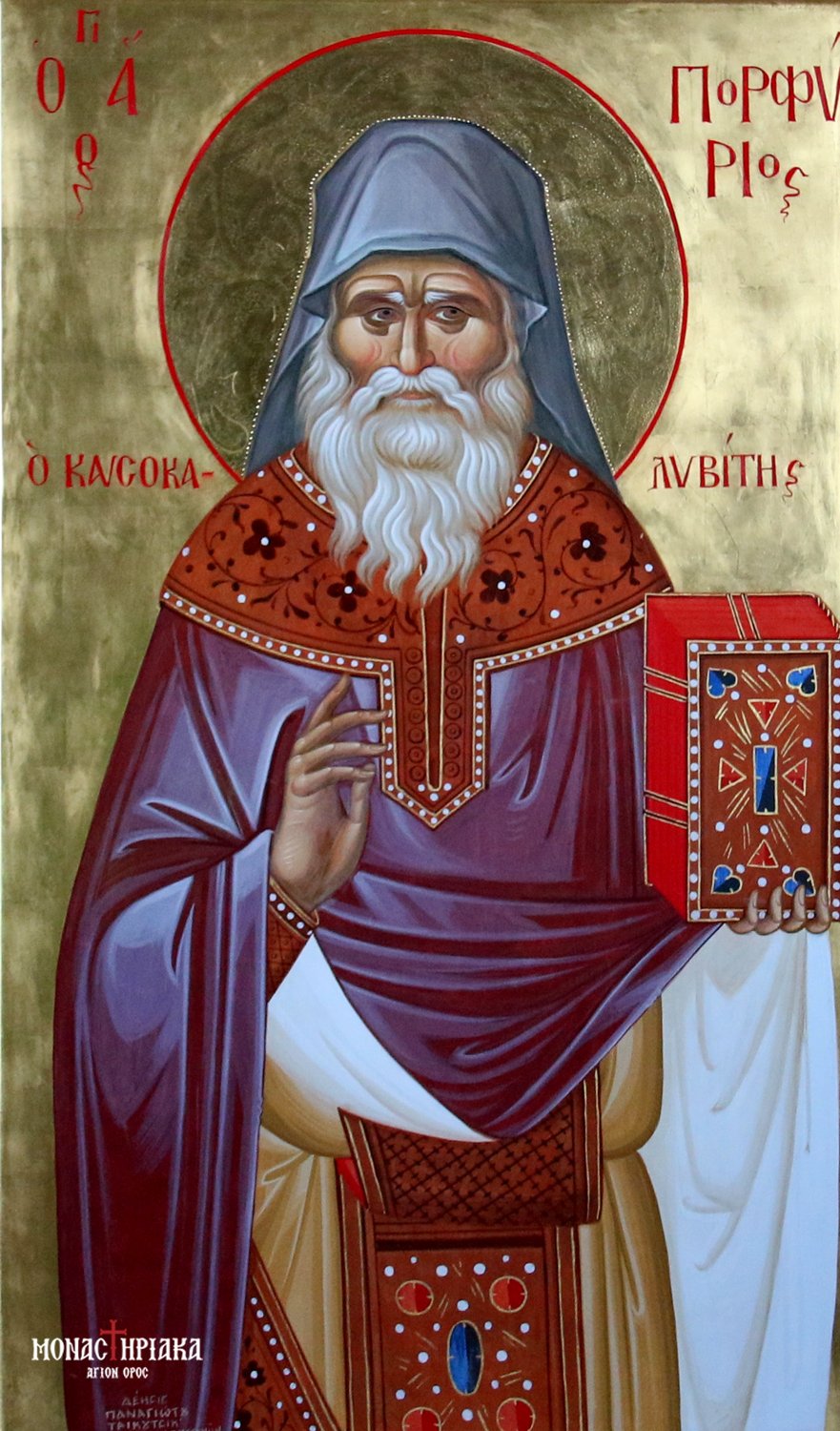
Departure from the Polyclinic
On the 16th February 1970, having completed thirty-five years of service as a priest, he received a small pension from the Hellenic Clerical Insurance Fund and left his duties at the Polyclinic. In essence, however, he remained until his replacement arrived. Even after that, he continued to visit the Polyclinic to meet his great number of spiritual children. Finally, around 1973, he minimized his visits to the Polyclinic and instead received his spiritual children at St. Nicholas’ in Kallisia, Pendeli, where he celebrated the liturgy and heard confession.
Towards the end of his service at the Polyclinic, he became ill with kidney trouble. However, he was operated only when his sickness was in its advanced stages. This was because he worked tirelessly despite his illness. He had become used to being obedient "unto death". He was obedient even to the director of the Polyclinic, who told him to put off the operation, so that he could celebrate the services for Holy Week. This delay resulted in him slipping into coma. The doctors told his relatives to prepare for his funeral. However, by divine will, and despite all medical expectations, the Elder returned to earthly life to continue his service to the members of the Church.
On the 20th August 1978, while at St. Nicholas, Kallisia, he had a heart attack (myocardial stroke). He was rushed to the "Hygeia" hospital, where he remained for twenty days. When he left the infirmary, he continued his convalescence in Athens in the homes of some of his spiritual children. This was for three reasons. Firstly, he couldn’t go to St. Nicholas, Kallisia, as there was no road and he would have to walk a long way on foot. Furthermore, his house in Turkovounia did not even have the most basic comforts. Finally, he had to be near to doctors.
Later, when he had settled into a temporary shelter in Milesi, the site of the convent he founded, he had an operation on his left eye. The doctor made a mistake, destroying the sight in that eye. After a few years the Elder became completely blind. During the operation, without Elder Porphyrios’ permission, the doctor gave him a strong dose of cortisone. The Elder was particularly sensitive to medication, and especially to cortisone. The result of this injection was continuous stomach-haemorraghing, which returned every three months or so. Because of his constantly bleeding stomach, he couldn’t eat regular food. He sustained himself with a few spoonfuls of milk and water each day. This resulted in him becoming so physically exhausted that he reached the point, where he could not even sit up straight. He received twelve blood transfusions, all of them in his accommodation at Milesi. In the end, although he was again at Death’s door, by the grace of God he survived.
From that time on, his physical health was terribly compromised. However, he continued, his ministry as a spiritual father as much as he could, all the time confessing for shorter periods and often suffering from various other health problems and in the most frightful pain. Indeed, he steadily lost his sight, until in 1987 he became completely blind. He steadily decreased the words of advice he gave to people, and increased the prayers he said to God for them. He silently prayed with great love and humility for all those, who sought his prayer and help from God. With spiritual joy, he saw divine grace acting upon them. Thus, Elder Porphyrios became a clear example of St. Paul the Apostle words, "My strength is made perfect in weakness."
Return to the Holy Mountain
Elder Porphyrios had never emotionally left Mt. Athos. There was no other subject that interested him more than the Holy Mountain, and especially Kavsokalyvia. For many years he had a hut there, in the name of a disciple of his, who he visited on occasion. When he heard in 1984 that the last resident of St. George’s hut had left and taken up residence in another monastery, he hastened to the Holy Great Lavra of St. Athanasios, to whom it belonged and asked that it be given to him. It was at St. George’s that he had first taken his monastic vows. He had always wanted to return, to keep the vow made at his tonsure some sixty years earlier, to remain in his monastery until his last breath. He was now getting ready for his final journey.
The hut was given to him according to the customs of Mt. Athos, with the monastery’s sealed pledge, dated 21st September 1984. Elder Porphyrios settled different disciples of his there in succession. In the summer of 1991 there were five. This is the number, which he had mentioned to a spiritual child of his some three years ago as the total that indicated the year of his death.
"Through my coming to you again"
Elder Porphyrios left Attica for Mt. Athos with the hidden intention of never returning again. He had spoken to enough of his spiritual children in such a way that they knew they were seeing him for the last time. To others he just hinted. It was only after his death that they realized what he meant. Naturally, to those who would not be able to stand the news of his departure, he told them that he would be coming back. He said so many things about his death, either clearly or in a cryptic way, so much so, that only the certainty of those around him that he would survive like all the other times (a hope born of desire), can possibly explain the suddenness of the announcement of his death.
His spiritual children in Athens were constantly calling upon him and he was twice forced to return to the Convent against his will. Here, he gave consolation to all those who needed it. On each occasion, he stayed only for a few days, "that our rejoicing for him would be more abundant in Jesus Christ by his coming to us." (Paraphrasing the words of the Apostle, Phil. 1:26.) He would then hurry back to Mt. Athos as quickly as possible. He ardently desired to die there and to be quietly buried in the midst of prayer and repentance.
Towards the end of his physical life, he became uneasy over the possibility of his spiritual children’s love affecting his wish to die alone. He was used to being obedient and submitting to others. Therefore, he told one of his monks. "If I tell you to take me back to Athens, prevent me, it will be from temptation". Indeed, many friends of his had made different plans to bring him back to Athens, since winter was approaching and his health was getting worse.
He sleeps in the Lord
God, who fulfills the desires of those who feared him, fulfilled Elder Porphyrios’ wish. He made him worthy of having a blessed end in extreme humbleness and obscurity. He was surrounded only by his disciples on Mt. Athos, who prayed with him. On the last night of his earthly life, he went to confession and prayed comprehensibly. His disciples read the Fiftieth and other psalms and the service for the dying. They said the short prayer, "Lord Jesus Christ, have mercy upon me" until they had completed the rule of a great schema monk.
With great love, his disciples offered him what he needed, a little bodily and lot of spiritual comfort. For a long time, they could hear his holy lips whispering the last words that came from his venerable mouth. These were the same words Christ prayed on the eve of his crucifixion "that we may be one".
After this, they heard him repeat only one word. The word that is found at the end of the New Testament, at the conclusion of the Divine Apocalypse (Revelation) of St. John, "Come" ("Yes, come, Lord Jesus"). The Lord, his sweet Jesus came. The saintly soul of Elder Porphyrios left his body at 4:31 on the morning of the 2nd of December, 1991 and journeyed towards heaven.
His venerable body, dressed in the monastic manner, was placed in the main church of Kavsokalyvia. According to custom, the fathers there read the Gospel all day, and during the night they held an all-night vigil. Everything was done in agreement with the detailed verbal instructions of Elder Porphyrios. They had been written down to avoid any mistake.
